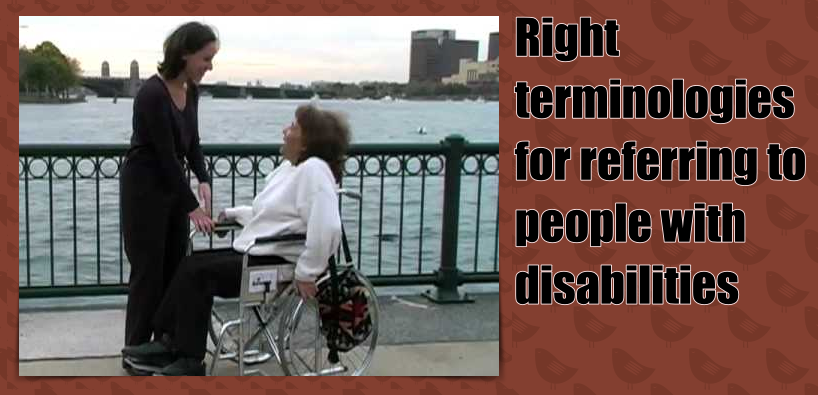
There are so any terminologies for referring people with disabilities.
Many disability professionals in the meetings/seminars/workplaces may have been rebuked by a colleague/participant for using the term ‘disability’. They would have got a lecture why the term disability should not be used and instead terms like specially abled, differently abled and specially enabled etc. should be used. The newest terminology is the term “Divyang” in Hindi (meaning devine organ). Not just outside disability sector, but also within the sector. You may have heard statements “do not look at disability look at ability”. What they actually mean is do not look at impairment but look at their skills.
On the other hand, the disability movement nationally and internationally feel disability or persons with disability is the right terminology.
Why is that so?
People with disabilities feel that the term “disabled” comes close to what they experience in their day-to-day life. They say, “We are disabled by the the various barriers that exist in the society”. Barriers could be physical, social, communicational, political etc. A person using a wheelchair is disabled by the steps and not because she/he cannot walk. The problem lies in the society and not in the individual. Similarly a deaf person is disabled because of lack of caption in a film. The term disability rightfully conveys this experience of being disabled by the barriers.
You may have also heard terms like physically challenged, vertically challenged etc. They are not considered appropriate as again the focus is on the individual and not on the barriers. Media uses the term differently abled. This has been discarded by the disability sector as patronising. The arguments is everyone is different is certain ways and similar in other ways, This term kind of excludes/segregates people with disabilities.
Now people use the abbreviated term PWD – PWD candidate/employee, diversity hire etc. These seem more like labeling. Even English is wrong. What is PWD candidate (person with disability candidate?) Candidate with a disability is correct English. One should be careful in using these abbreviations or the labels. If you want to say the candidate has a disability to a recruiter. Say that so and so… has this qualification, experience, etc.. Then you could mention, the person has a disability and she/he needs such and such accommodation, as a matter of fact. There are also concerns related to confidentiality of information etc which we will discuss in another blog.
Another approach that is important in the terminology subject, is to use of the term ‘person’. This aims to avoid subconscious dehumanisation of people with disabilities/ medical conditions. You may have heard people saying so and so is autistic, epileptic, dyslexic, etc. as if the whole person is defined by the condition/disability. Hence, ‘people with disability’, person with autism, person with low vision, etc. are to be used.
Accepted Terms
| Appropriate | Inappropriate |
| Person with disability Disabled person | Handicapped Differently abled/crippled Special people Divyang The disabled |
| Person with visual disability Person with blindness Person with low vision | The blind |
| Deaf person Hard of hearing person | Deaf-mute/dumb |
| Person with intellectual disability | Mentally retarded /Retard |
| Person with psychosocial disability/mental illness | Mad, Psycho |
| Person with autism/person with epilepsy/person with hemophilia/person affected by Leprosy | Autistic/Epileptic/Hemophilic/Leper |
| Wheelchair user | Wheelchair bound |
